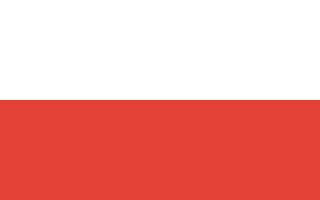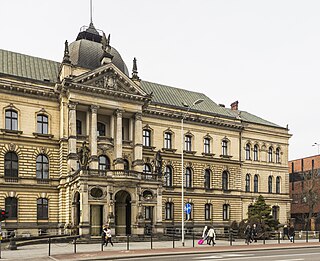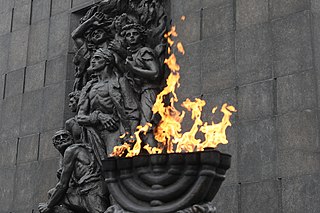Related Research Articles

Gdańsk is a city on the Baltic coast of northern Poland, and the capital of the Pomeranian Voivodeship. With a population of 486,492, it is Poland's sixth-largest city and principal seaport. Gdańsk lies at the mouth of the Motława River and is situated at the southern edge of Gdańsk Bay, close to the city of Gdynia and resort town of Sopot; these form a metropolitan area called the Tricity (Trójmiasto), with a population of approximately 1.5 million.

The Second Polish Republic, at the time officially known as the Republic of Poland, was a country in Central and Eastern Europe that existed between 7 October 1918 and 6 October 1939. The state was established in the final stage of World War I. The Second Republic ceased to exist in 1939, after Poland was invaded by Nazi Germany, the Soviet Union, and the Slovak Republic, marking the beginning of the European theatre of the Second World War. The Polish government-in-exile was established in Paris and later London after the fall of France in 1940.

Kraków, also spelled as Cracow or Krakow, is the second-largest and one of the oldest cities in Poland. Situated on the Vistula River in Lesser Poland Voivodeship, the city dates back to the seventh century. Kraków was the official capital of Poland until 1596, and has traditionally been one of the leading centres of Polish academic, economic, cultural, and artistic life. Cited as one of Europe's most beautiful cities, its Old Town with Wawel Royal Castle was declared a UNESCO World Heritage Site in 1978, one of the world's first sites granted the status.

Poland, officially the Republic of Poland, is a country in Central Europe. Poland is divided into sixteen voivodeships and is the fifth-most populous member state of the European Union (EU), with population of over 39 million people, and the seventh-largest EU country, covering a combined area of 312,696 km2 (120,733 sq mi). It extends from the Baltic Sea in the north to the Sudetes and Carpathian Mountains in the south, bordering seven countries. The territory is characterised by a varied landscape, diverse ecosystems, and temperate transitional climate. The capital and largest city is Warsaw; other major cities include Kraków, Wrocław, Łódź, Poznań, and Gdańsk.

Polish is a West Slavic language of the Lechitic group within the Indo-European language family written in the Latin script. It is primarily spoken in Poland and serves as the official language of the country, as well as the language of the Polish diaspora around the world. In 2023, there were over 40.6 million Polish native speakers. It ranks as the sixth most-spoken among languages of the European Union. Polish is subdivided into regional dialects and maintains strict T–V distinction pronouns, honorifics, and various forms of formalities when addressing individuals.

Szczecin is the capital and largest city of the West Pomeranian Voivodeship in northwestern Poland. Located near the Baltic Sea and the German border, it is a major seaport and Poland's seventh-largest city. As of 31 December 2022, the population was 391,566.

Warsaw, officially the Capital City of Warsaw, is the capital and largest city of Poland. The metropolis stands on the River Vistula in east-central Poland. Its population is officially estimated at 1.86 million residents within a greater metropolitan area of 3.27 million residents, which makes Warsaw the 7th most-populous city in the European Union. The city area measures 517 km2 (200 sq mi) and comprises 18 districts, while the metropolitan area covers 6,100 km2 (2,355 sq mi). Warsaw is classified as an alpha global city, a major cultural, political and economic hub, and the country's seat of government. It is also capital of the Masovian Voivodeship.

Wrocław is a city in southwestern Poland and the largest city in the historical region of Silesia. It lies on the banks of the Oder in the Silesian Lowlands of Central Europe, roughly 40 kilometres (25 mi) from the Sudeten Mountains to the south. As of 2023, the official population of Wrocław is 674,132 making it the third largest city in Poland. The population of the Wrocław metropolitan area is around 1.25 million.

Białystok is the largest city in northeastern Poland and the capital of the Podlaskie Voivodeship. It is the tenth-largest city in Poland, second in terms of population density, and thirteenth in area.

Lviv is the largest city in western Ukraine, as well as the sixth-largest city in Ukraine, with a population of 717,500. It serves as the administrative centre of Lviv Oblast and Lviv Raion, and is one of the main cultural centres of Ukraine. Lviv also hosts the administration of Lviv urban hromada. It was named after Leo I of Galicia, the eldest son of Daniel, King of Ruthenia.

Polish people, or Poles, are a West Slavic ethnic group and nation who share a common history, culture, the Polish language and are identified with the country of Poland in Central Europe. The preamble to the Constitution of the Republic of Poland defines the Polish nation as comprising all the citizens of Poland, regardless of heritage or ethnicity. The majority of Poles adhere to Roman Catholicism.

The Invasion of Poland, also known as the September Campaign, Polish Campaign, War of Poland of 1939, and Polish Defensive War of 1939, was a joint attack on the Republic of Poland by Nazi Germany, the Slovak Republic, and the Soviet Union, which marked the beginning of World War II. The German invasion began on 1 September 1939, one week after the signing of the Molotov–Ribbentrop Pact between Germany and the Soviet Union, and one day after the Supreme Soviet of the Soviet Union had approved the pact. One of the aims of the invasion was to divide Polish territory at the end of the operation; Poland was to cease to exist as a country and all Poles were to be exterminated. The Soviets invaded Poland on 17 September. The campaign ended on 6 October with Germany and the Soviet Union dividing and annexing the whole of Poland under the terms of the German–Soviet Frontier Treaty. The invasion is also known in Poland as the September campaign or 1939 defensive war and known in Germany as the Poland campaign.

Poland–Lithuania, formally known as the Kingdom of Poland and the Grand Duchy of Lithuania and also referred to as the Polish–Lithuanian Commonwealth or the First Polish Republic, was a bi-confederal state, sometimes called a federation, of Poland and Lithuania ruled by a common monarch in real union, who was both King of Poland and Grand Duke of Lithuania. It was one of the largest and most populous countries of 16th- to 17th-century Europe. At its largest territorial extent, in the early 17th century, the Commonwealth covered almost 1,000,000 km2 (400,000 sq mi) and as of 1618 sustained a multi-ethnic population of almost 12 million. Polish and Latin were the two co-official languages, and Catholicism served as the state religion.

The Polish–Soviet War was fought primarily between the Second Polish Republic and the Russian Soviet Federative Socialist Republic before it became a union republic in the aftermath of World War I and the Russian Revolution, on territories which were previously held by the Russian Empire and the Habsburg Monarchy following the Partitions of Poland.

The Polish People's Republic (1952–1989), formerly the Republic of Poland (1947–1952), was a country in Central Europe that existed as the predecessor of the modern-day democratic Republic of Poland. With a population of approximately 37.9 million near the end of its existence, it was the second most-populous communist and Eastern Bloc country in Europe, and one of the main signatories of the Warsaw Pact alliance. The largest city and official capital since 1947 was Warsaw, followed by the industrial city of Łódź and cultural city of Kraków. The country was bordered by the Baltic Sea to the north, the Soviet Union to the east, Czechoslovakia to the south, and East Germany to the west.

The Warsaw Uprising, sometimes referred to as the August Uprising, was a major World War II operation by the Polish underground resistance to liberate Warsaw from German occupation. It occurred in the summer of 1944, and it was led by the Polish resistance Home Army. The uprising was timed to coincide with the retreat of the German forces from Poland ahead of the Soviet advance. While approaching the eastern suburbs of the city, the Red Army halted combat operations, enabling the Germans to regroup and defeat the Polish resistance and to destroy the city in retaliation. The Uprising was fought for 63 days with little outside support. It was the single largest military effort taken by any European resistance movement during World War II.

The history of the Jews in Poland dates back at least 1,000 years. For centuries, Poland was home to the largest and most significant Ashkenazi Jewish community in the world. Poland was a principal center of Jewish culture, because of the long period of statutory religious tolerance and social autonomy which ended after the Partitions of Poland in the 18th century. During World War II there was a nearly complete genocidal destruction of the Polish Jewish community by Nazi Germany and its collaborators of various nationalities, during the German occupation of Poland between 1939 and 1945, called the Holocaust. Since the fall of communism in Poland, there has been a renewed interest in Jewish culture, featuring an annual Jewish Culture Festival, new study programs at Polish secondary schools and universities, and the opening of Warsaw's Museum of the History of Polish Jews.

Legia Warszawa, commonly referred to as Legia Warsaw or simply Legia, is a professional football club based in Warsaw, Poland. Legia is the most successful Polish football club in history, winning record 15 Ekstraklasa champions titles, a record 20 Polish Cup and 5 Polish Super Cup trophies. The club's home venue is the Polish Army Stadium. Legia is the only Polish club never to have been relegated from the top flight of Polish football since World War II.

The Poland men's national volleyball team represents Poland in international volleyball competition. The team is directed by the Polish Volleyball Federation, the governing body for volleyball in Poland, which represents the country in international competitions and friendly matches.

The Armed Forces of the Republic of Poland, also called the Polish Armed Forces and popularly called Wojsko Polskie in Poland are the national armed forces of the Republic of Poland. The name has been used since the early 19th century, but can also be applied to earlier periods.